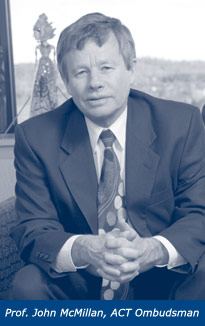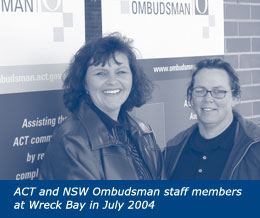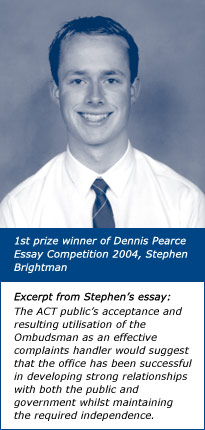Ombudsman overview
CHAPTER 1 | ombudsman overview
Introduction
 During the 16 years of its operation, the ACT Ombudsman's office has dealt with many thousands of ACT residents seeking assistance on matters as diverse as building applications, public housing, vehicle registration, child protection, policing and correctional services, and whistleblower protection.
During the 16 years of its operation, the ACT Ombudsman's office has dealt with many thousands of ACT residents seeking assistance on matters as diverse as building applications, public housing, vehicle registration, child protection, policing and correctional services, and whistleblower protection.
The ACT Ombudsman has been able to stimulate improvements in government administration through the experience and insights gained from handling complaints. Areas include the quality of decision making, internal complaint handling, transparency, record keeping, communication with the public, sensitivity to individual needs, and government accountability generally.
By fostering improved government administration, we can strengthen the community's confidence in the integrity and professionalism of government and we can support fairer and more accountable government.
ACT Ombudsman
The ACT Ombudsman considers complaints about the administrative actions of government departments and agencies and aims to foster good public administration by recommending remedies and changes to agency decisions, policies and procedures. The Ombudsman also makes submissions to government on legislative and policy reform.
The office investigates complaints in accordance with detailed written procedures, including relevant legislation, a Service Charter and complaint investigation guidelines. Complaint investigations are carried out impartially and independently, and are handled in private. Complaints may be made by telephone, in person or in writing (by letter, email or facsimile, or by using the online complaint form on our website). Anonymous complaints may be accepted.
'By fostering improved government administration, we can strengthen the community's confidence in the integrity and professionalism of government …'
The key values of the ACT Ombudsman are independence, impartiality, integrity, accessibility, professionalism and teamwork.
Legislation
The role of the ACT Ombudsman is performed under the Ombudsman Act 1989 (ACT). The Ombudsman also has specific responsibilities under the Freedom of Information Act 1989 (ACT) and the Complaints (Australian Federal Police) Act 1981 (Cth) (the Complaints Act), and is authorised to deal with whistleblower complaints under the Public Interest Disclosure Act 1994 (PID Act). Links to this legislation can be found at our website: www.ombudsman.act.gov.au.
Members of the Australian Federal Police (AFP) provide policing services for the ACT under an agreement with the ACT Government. Members of the AFP assigned to the AFP's ACT Region are engaged in community policing duties under the ACT Chief Police Officer, who is also an AFP Deputy Commissioner. Under the Complaints Act, responsibility for investigating complaints is shared between the AFP and the Ombudsman's office.
Annual reporting compliance
The ACT Ombudsman is neither a public authority nor an administrative unit within the meaning of the Annual Reports (Government Agencies) Act 2004 (ACT). Consequently, the ACT Ombudsman is unable to report against some aspects of the ACT Chief Minister's 2004–2005 Annual Report Directions.
Elements on which reports cannot be provided mainly relate to areas where ACT Ombudsman functions are intrinsically linked with broader Commonwealth Ombudsman organisational operations. They include:
- financial statements and financial reports
- whole of government issues
- risk management and internal audit arrangements
- fraud prevention arrangements
- staffing profile and human resource management issues
- procurement contracting principles and processes
- workplace injury prevention and management
- capital works management
- asset management strategy
- ecologically sustainable development and fuel management plans.
Reporting on these issues is provided for the office as a whole through the Commonwealth Ombudsman Annual Report 2004–05.
Major issues, challenges and achievements
Complaint handling remains the core of the ACT Ombudsman's role. In 2004–05, the office handled 902 complaints from the public. The complaint investigation role of the office is dealt with at length later in this report.
To ensure effective complaint handling and investigation, the office expends considerable effort on improving office systems and nurturing its relations with other agencies and groups in the community.
'Our aim is to help ensure that best administrative practice is an integral part of government planning.'
In 2004–05, we focused attention on improving the effectiveness of our operations in the three areas outlined below.
Positioning the office to maintain delivery of a high-quality, consistent complaint service
- A new complaints management system was developed to enhance our capacity to respond quickly and appropriately to complainants (to commence operation in October 2005).
- A user-friendly online complaint form was developed to facilitate email access in response to the ever-growing use of internet services (to be introduced in October 2005).
- Ongoing training was provided to staff to ensure they are well equipped to handle the increasing complexity of complaints.
Working with the ACT Government to enhance the quality of public administration and complaint handling in agencies
- Drawing from our expertise in public administration, comments were provided to ACT Government agencies on several key ACT Government initiatives, including the ACT Prison Project; our aim is to help ensure that best administrative practice is an integral part of government planning.
- Tailored training and briefing in good complaint management was conducted for ACT Government staff.
- Regular meetings were held with ACTGovernment agency and ACT Policing contact officers to maintain the good working relationships that are so valuable to the timely resolution of complaints.
 Broadening community awareness of the office and its role
Broadening community awareness of the office and its role
- Briefings were provided to new members of the ACT Legislative Assembly and their staff.
- There was an expansion of outreach activity to community and Indigenous groups, including to the Wreck Bay community.
- The Dennis Pearce Essay Competition was promoted as part of our commitment to raising youth awareness of the role of the Ombudsman across the ACT.
ACT Ombudsman shopfront
In June 2004, the ACT Chief Minister, Jon Stanhope MLA, opened the Ombudsman's shopfront on the ground floor of 1 Farrell Place, Canberra City. The opening of the shopfront has made the office more accessible to the ACT community, and is an important element of providing public access to the office, symbolically as well as practically. While the shopfront has increased the office's public profile, it has brought with it an increased obligation to provide personal assistance to individuals.
'Managing the expectations of complainants is an ongoing challenge for the office.'
Complainants sometimes regard the office as an important last resort, and they can be highly agitated and emotional when discussing their complaints. There has also been an increase in the number of complainants who drop into the office repeatedly, despite having been advised that the issue about which they are complaining is not within our jurisdiction. Managing the expectations of complainants is an ongoing challenge for the office.
Ombudsman seminar for ACT contact officers
The Ombudsman's office has an ongoing program of training for ACT Government complaints contact officers. As part of this program, we held a successful seminar for contact officers in May 2005. The seminar, entitled 'Promoting Good Administration', covered the principles and processes involved in good administration of complaint handling.
The program aims to assist contact officers to improve practical complaint-handling skills as well as to enhance their understanding of policy and legislation in decision making. The seminar was well received by over 40 participants from 34 agencies.
Dennis Pearce Essay Competition
 In our 2003–04 annual report, we provided details of an inaugural essay competition for ACT college students. Named after the first ACT Ombudsman, Professor Dennis Pearce, the competition was open to Year 11 and Year 12 students, who were asked to address the topic: The ACT Ombudsman—a watchdog on government.
In our 2003–04 annual report, we provided details of an inaugural essay competition for ACT college students. Named after the first ACT Ombudsman, Professor Dennis Pearce, the competition was open to Year 11 and Year 12 students, who were asked to address the topic: The ACT Ombudsman—a watchdog on government.
Although the competition attracted only a small number of entries in 2004–05, we were delighted with the quality and originality of the essays received. The purpose of the competition was to stimulate critical interest in the role of the Ombudsman as an accountability agency in a democratic system of government.
The essays captured that theme very well, emphasising how important it is for members of the public to have an independent office to which they can turn. At the same time, the essays drew attention to the challenges facing the Ombudsman if the office is to fulfil its objectives.
The winning essay was from Stephen Brightman, a Year 12 student at Radford College, who received a $300 cash prize. We published the winning entries on our website at www.ombudsman.act.gov.au.
In 2005–06, the topic for the essay competition will address the question of whether there is a need for a youth ombudsman in the ACT. We are currently working with the ACT Chief Minister's office to promote the competition widely through schools and colleges.
Performance overview
The office dealt with 902 complaints about ACT Government agencies and ACT Policing in 2004–05. These figures have remained at a fairly stable level over the last four years.
The principal performance measures for the Ombudsman are complaints received and finalised, time taken to finalise complaints, and quality of training and liaison. An overview follows, with detailed information included in the 'Performance' section of this report.
Complaint trends
In 2004–05, there was a slight reduction in the overall number of complaints received about ACT Government departments and agencies and ACT Policing—902 complaints compared to 955 in the previous year.
There was a small increase in the number of complaints received about ACT Government agencies (as distinct from ACT Policing complaints)—459 in 2004–05 compared to 452 in 2003–04.
The largest number of complaints received about a single agency involved ACT Corrective Services, with 104 complaints received in 2004–05, which is only marginally higher than the 102 received in 2003–04. Other agencies that accounted for a significant number of complaints included: Housing ACT (83 complaints); ACT Road User Services (51 complaints); ACT Office for Children, Youth and Family Support (50 complaints); and ACT Planning and Land Authority (44 complaints).
We also saw a decrease in complaints about the ACT Magistrates Court (eight complaints compared to 18 last year) and the ACT Public Trustee (five complaints compared to 16 last year).
For ACT Policing, there was a 12% decrease in complaints received (443 in 2004–05 compared to 503 in 2003–04). This is indicative of a general decrease in the number of complaints made about ACT Policing over the past seven years. Analysis of complaints received and finalised is provided in the 'Performance' section of this report.
Submissions and own motion investigations
A distinct role of the Ombudsman is to contribute to public discussion on administrative law and public administration and to foster good public administration that is accountable, lawful, fair, transparent and responsive.
In this context we made submissions to, or commented on, a range of administrative practice matters, cabinet submissions and legislative proposals during the year. An example is a submission to the review of the Public Interest Disclosure Act 1994.
The Ombudsman also has authority to undertake investigations on his own initiative ('own motion' investigations)—for example, relating to systemic issues where a change is needed in law, policy, procedure or practice to prevent the problem from recurring. Experience shows that own motion investigations are useful in improving overall administrative procedures across government.
In 2004–05, the Ombudsman conducted an own motion investigation into Traffic Infringement Notices (TINs) issued in a residential street in Lyneham, ACT. The investigation identified a systemic problem in advice provided to motorists about the speed limit applicable in the area, resulting in the withdrawal of over 470 TINs issued to motorists. More detail is provided in the 'Performance' section of this report.
'Experience shows that own motion investigations are useful in improving overall administrative procedures across government.'
An own motion investigation was also commenced into the management of, and conditions for, detainees in the Belconnen Remand Centre. This investigation is expected to be completed in 2005–06.
Review of Ombudsman's role
In 2003–04, we reported that a review of the Commonwealth Ombudsman's legislation was being undertaken, with a view to putting proposals to government for the enactment of a new Ombudsman Act. It was noted that the ACT Government would be consulted in the course of this review. We expect to consult with the ACT Government when the review has been completed and proposals for any amendments have been finalised.
We also reported on discussions with the ACT Government about the most appropriate model for handling disclosures made under the PID Act. Our view was that primary responsibility for investigation should remain with the agency to which a disclosure relates, with the oversight agencies being notified at an early stage.
The increased number of Public Interest Disclosures (PIDs) received by the Ombudsman's office in 2004–05 suggests that further discussion needs to take place on the management of these disclosures. Information on PIDs is provided in the 'Information and access' section of this report.
Outlook for 2005–06
New memorandum of understanding
The existing Memorandum of Understanding (MOU) with the ACT Government for the provision of Ombudsman services in relation to ACT Government agencies and ACT Policing was extended to 30 June 2005 by mutual agreement.
We are currently finalising negotiations for a new MOU, which will take account of expected impacts on the complaint workload of the office. These include developments such as the new ACT prison, the increase in PID complaints, and changes to the way complaints about ACT Policing are managed.
ACT Government agencies
There are a few areas of concern to the office that will receive attention in the coming year. These include:
- handling the increasing number of whistleblower complaints made under the PID Act that raise the troublesome dividing line between disclosures under the Act and staff grievances against an agency
- managing complaints that cross the jurisdictions of two or more agencies—recent complaints have highlighted problems that can arise where complaint issues involve the administrative actions and policies of more than one agency
- managing complaints related to outsourced government programs—this issue was identified in our submission to the recent Review of the System of Statutory Oversight of Government in the ACT.
ACT Policing
The response of ACT Policing to individual complaints continues to be the core issue in our oversight of ACT Policing. Ombudsman staff will continue to be active in ensuring that the AFP's complaint management system provides an effective response to individual complainants and provides public assurance about police accountability.
Recent recruitment within the Ombudsman's Law Enforcement Team will allow further development of our own motion investigation functions relating to ACT Policing. These own motion investigations will focus on areas where police interaction with the public remains problematic, and will draw on the office's inspection experience with certain Australian Government law enforcement activities.
In conclusion
This year's annual report covers a range of activities on which the Ombudsman is able to report, among them: how complaints about government were handled, the response by ACT Government agencies to accountability requirements, issues in ACT Policing, and own motion and special investigations.
It is pleasing to report that the ACT Ombudsman Annual Report 2003—04 won two bronze awards from the ACT Division of the Institute of Public Administration Australia. The awards were for the quality of the report in the ACT Government category and the Commonwealth and ACT on-line category.
Annual reports are a vital step in ensuring government accountability to the public. In keeping with that aim, the annual reports of the ACT Ombudsman reflect on how complaints about government have been handled throughout the year.
Prof. John McMillan
Australian Capital Territory Ombudsman
